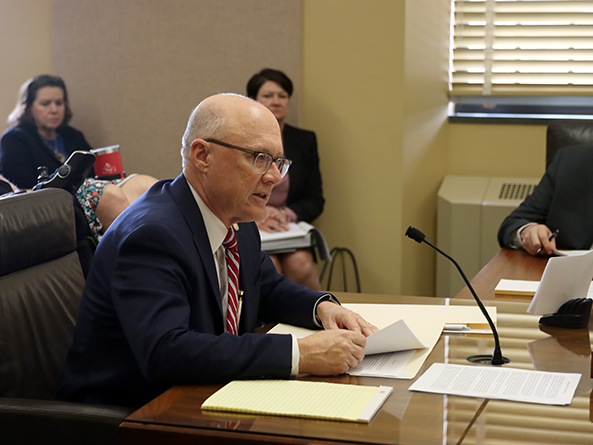Proposals would clarify legislative oversight, create special committee
The Executive Board considered two measures Feb. 14 that were introduced in response to a 2023 attorney general’s opinion that cast doubt on the constitutionality of legislative oversight offices.

The status of the Office of Public Counsel and the offices of Inspector General of Nebraska Child Welfare and Inspector General of the Nebraska Correctional System have been in question since the attorney general issued his opinion in August of last year.
Speaker John Arch of La Vista introduced two measures designed to restore the offices’ access to the people, records and facilities needed to carry out their oversight of the state’s child welfare and corrections systems. That access was removed by the executive branch following the attorney general’s opinion, he said.
Arch described the two proposals as “separate but intertwined” — not only with each other, but with a memorandum of understanding that was signed by representatives of the legislative and executive branches hours before the public hearing. The MOU will restore access for the offices for two years, he said, during which time the Legislature will carry out a study of its oversight functions under LR298 and implement any recommended changes.
LR298 would create the Legislative Oversight Review Special Committee of the Legislature. Members would include the speaker, chairpersons of the Executive Board, Judiciary and Health and Human Services committees, two at-large members of the Executive Board and three at-large members of the Legislature.
The committee would study the structure and organization of current legislative oversight functions that exist within legislative divisions and offices. The committee also could study oversight conducted by statutorily created boards and commissions in Nebraska and the legislative oversight functions of other state legislatures.
The committee would issue a report and any recommendations no later than Dec. 15, 2024, and would terminate Dec. 31, 2024.
Arch said the Legislature’s oversight role is “complex and multifaceted,” and that a holistic evaluation such as the committee could provide is needed. To date, oversight often has been in response to critical incidents, he said, such as the state’s troubled attempt to privatize child welfare or deaths in prison facilities.
“The concern is that if we simply address the immediate issue of the inspectors general, we will need to return and address the additional, broader issues of other legislative oversight functions again in the near term,” Arch said.
LB1321, also sponsored by Arch, would transfer the statutes that govern the offices to another chapter of state law that governs legislative functions in order to clarify their roles. It also would make a number of other changes, including eliminating oversight of juvenile probation from the OIG for Child Welfare. Arch noted, however, that he filed an amendment to the bill that would restore that oversight.
Julie Rogers, the state’s public counsel, testified in support of the proposal. Prior to the attorney general’s opinion, she said, the office — which was established in 1971 — had never been denied information needed to carry out its duties.
“We are anxious to get back to our important, independent work for the Legislature and for the public,” Rogers said.
Inspector General of Child Welfare Jennifer Carter also spoke in favor of the bill, saying her office previously had a productive relationship with the state Department of Health and Human Services. Since the attorney general’s opinion, however, the office has stopped receiving notifications of deaths or serious injuries in the child welfare system, she said.
“Our ability to provide the review and accountability we were tasked with by the Legislature has been significantly hindered,” Carter said.
Other testimony focused on the provision in LB1321 as introduced that would remove oversight of juvenile probation from the OIG of Child Welfare.
Corey Steel, Nebraska state court administrator, supported the proposal. Youth under probation supervision are not in the state’s custody, he said, and therefore should not be subject to oversight by the OIG, which is tasked with oversight of state wards.
Steel echoed the attorney general’s assertion that such oversight of one branch of government by another would be unconstitutional.
“The independence of the judiciary is the fundamental element of our government,” he said. “Judges must be free to adjudicate youth under their jurisdiction without threat of investigation by another branch of government.”
A number of members of law enforcement testified in opposition to the bill as introduced, based on that same provision, including Patrick Dempsey, representing the Omaha Police Officers Association.
Dempsey said there is a “critical need” for enhanced transparency and oversight in the state’s juvenile probation system. The judicial branch has failed to provide law enforcement with probation data, he said, which compromises their ability to uphold public safety.
The committee took no immediate action on either proposal.


